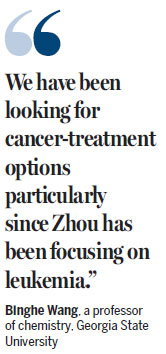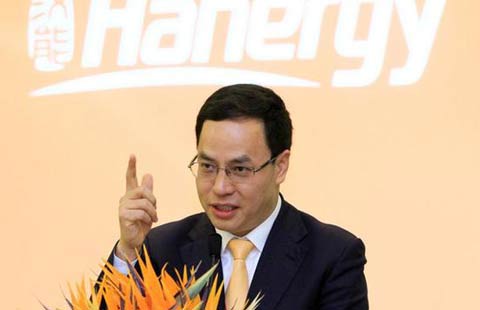School, firm to link up in cancer fight
Updated: 2015-02-25 11:46
By Paul Welitzkin in New York(China Daily USA)
|
||||||||
Chinese professor, biologist have designed two viable compounds
Georgia State University and a China-based pharmaceutical company have agreed to develop cancer-fighting compounds designed by two Chinese natives.
The compounds are designed by Binghe Wang, a professor of chemistry at the school in collaboration with cancer biologist Muxiang Zhou of Emory University.
Cisen Pharmaceutical Co Ltd, which is based in Jining in Shandong province, will gain access to a potential leukemia-fighting drug that increases levels of p53, a naturally-occurring protein that kills cancer i cells. In certain cancers, cancerous cells are able to subdue p53 levels making it easier for the cells to survive. Wang has been successful in formulating a group of compounds that inhibit the ability of the cancer to suppress p53.
"We have been working on this for about two years," Wang said in an interview. "We have been looking for cancer-treatment options particularly since Zhou has been focusing on leukemia."
Wang and Zhou are Chinese natives with Wang hailing from Beijing and Zhou from Shanghai. However they didn't meet until both were working professionally in Atlanta, where Georgia State and Emory are located just a few miles apart.
"We met at a professionals' event in Atlanta. I do think the fact that we are Chinese helped to facilitate this agreement," said Wang. "However it wasn't the main reason for Cisen's interest."

Wang believes the compounds may also be effective against other cancers. "I think this should be good for a number of cancers. However, we are focusing on leukemia which is Zhou's expertise because it is more cost effective to conduct animal studies that target one cancer. This is a common approach when developing a cancer treatment," he said.
How long will it take to come up with a treatment regiment utilizing this research? "In an optimistic assessment, I would say we are about 5-7 years away from that," Wang said.
The compounds, when commercialized under terms of the Feb 20 agreement, could be worth millions of dollars. "Both Georgia State University and Emory University will split the royalties," Zhou said in an e-mail.
Georgia State and Cisen will conduct clinical trials and develop a product for the Chinese market. Georgia State retains the right to partner with companies worldwide to develop the product for the US and other markets.
"Part of this agreement allows Georgia State to work with Cisen to find partners in other parts of the world to engage in other partnerships," said Chester Bisbee, associate vice president and director of the office of technology licensing and commercialization at Georgia State.
"We have been increasing our efforts in this area - encouraging our faculty to conduct research and work with the private sector to develop technologies," Bisbee said. "This is a major agreement around therapeutic development."
Bisbee said this enables Wang to maintain outside relationships. "We expect revenue from this but what is really important is that Wang will be continuing a relationship with Cisen and also has the possibility of developing new relationships."
Wang hopes this will inspire similar initiatives in the US. "The model we are using can and should be duplicated by other institutions," he said.
paulwelitzkin@chinadailyusa.com
Most Viewed
Editor's Picks

|

|

|

|

|

|
Today's Top News
US State Dept calls for cyber security boost
Anbang buys another piece of Manhattan
California here we come: Chinese
Port dispute over, shelves take time to restock
School, firm to link up in cancer fight
Killer of 'American Sniper' Kyle jailed for life
Alaska quietly becomes 3rd US state to legalize marijuana
Highly skilled immigrant spouses can soon work in US
US Weekly

|

|















